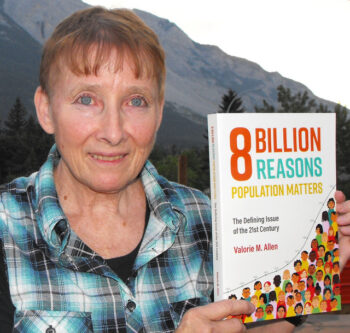Local author examines looming global population crisis
By Ry Clarke - Lethbridge Herald Local Journalism Initiative Reporter on September 7, 2022.
 Submitted photo
Valorie Allen's book, 8 Billion Reasons Population Matters, explores her research and studies on the issues of overpopulation.
Submitted photo
Valorie Allen's book, 8 Billion Reasons Population Matters, explores her research and studies on the issues of overpopulation.Valorie Allen, a former resident of Lethbridge now living in the Crowsnest Pass, has published a new book advocating for the awareness of overpopulation and the lasting effects we have on our environment.
8 Billion Reasons Population Matters, published by Friesen Press on April 19, explores an in-depth view of the planet’s growing population and depletion of resources contributing to many of our issues. Allen has spent the last 35 years working with environmental, population, and animal rights groups and is a member of the Population Institute Canada using her experience along with education to delve into these issues and present solutions to help curb the growing impact of overpopulation.
“The title says a lot. I chose 8 billion because this year, probably November, we will be hitting that number in population. It’s a very critical level. Most of the research groups, university studies, population groups, and other distinguished thinkers have come to the conclusion and agreement that a sustainable population level would be between two and three billion,” said Allen. “So that’s why I chose the title, because there are so many reasons that things are getting worse right now. The root cause of it all, from my research, was the growing population.”
With viewpoints and historical facts Allen looks to add content for both academic and regular readers, making the book understandable for any audience.
“I’ve designed it a little differently than my first book, because this book is designed for the most audiences. I’ve written it at a level that is appropriate for the audience, but it’s also designed for the education system. It has footnotes, and goes a little more in depth into issues like politics, religion, human trafficking and women’s issues. Because this book is written from a woman’s perspective, which is quite different than most of the other books on population, I’m hoping that it appeals to a wider audience, and can be accepted in the education system,” said Allen.
Presenting a flow that addresses the many issues towards overpopulation, Allen uses her research to present how the issue can be curbed with solutions that are not extremes but something the everyday person can do.
“It wouldn’t take any coercive measures at all. A lot of people when they think about population, think about China and the one child policy. Well, that isn’t happening anymore in China or anywhere. All of the success stories in my book, are not using coercive measures,” said Allen. “I have a whole section near the back of the book, called ‘a little good news’, and it outlines solutions. Education about family planning, education about the impact each child has on the planet. But even more education on the impact that the environment and climate change have on deteriorating environmental conditions. With rising food costs, and all of these other things, they are going to have an impact on our children in the future.”
With a goal of education and spreading awareness for our planet’s overpopulation, Allen hopes her book can educate on the growing risk of an increasing population and the lasting effects it will have on our future.
“Almost all of the issues I’ve been working on have gotten worse, instead of better. Issues like climate change, extinction of species, and population, they’re connected. That’s what drove me, seeing how they’re all connected. I’ve become very passionate about population and my work with the education field made me realize there’s a big gap in the education system. Being able to have an influence on students and help them understand the connection between population and all the other issues that are affecting them right now. It’s a global issue and I really wanted to make people understand that,” said Allen.
10-9




